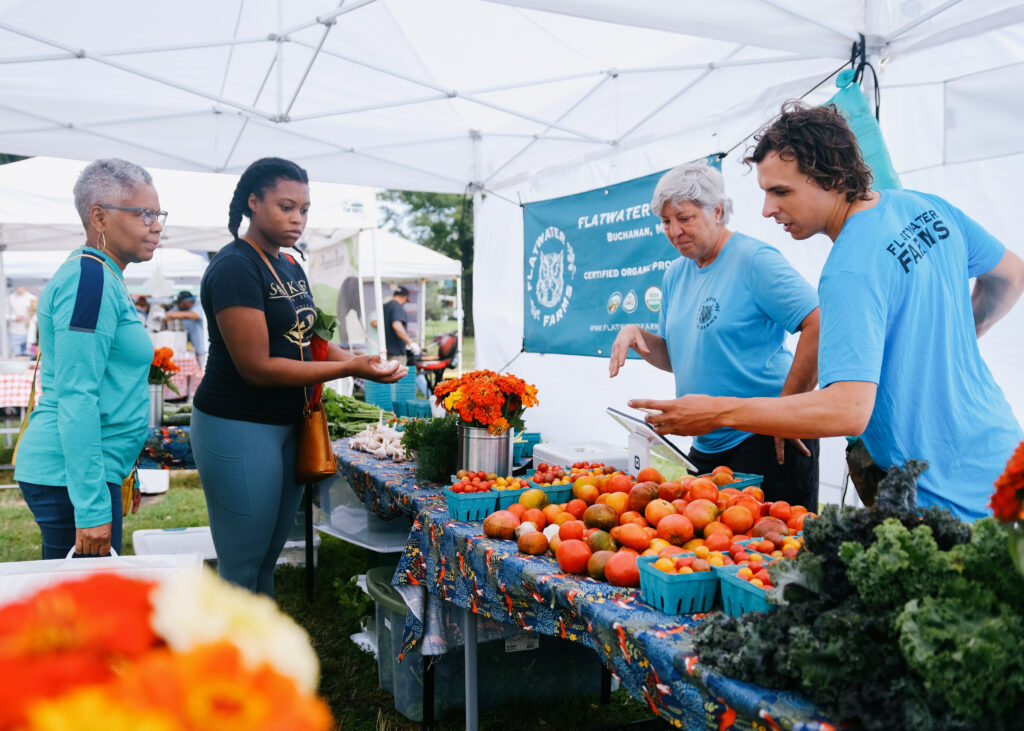
11 Ways Chicago’s Farmers Markets Secure the Future of Food
Food insecurity, failing farms, food waste—no matter how you plate it, the current reality of our food system lacks sustenance.
“Food security — the ability to obtain and use sufficient amounts of safe and nutritious food,” per the USDA, “is a fundamental human need.” Yet climate change, as it creates increasingly erratic weather patterns, threatens to jeopardize our food sources and upend the livelihoods of Midwestern farmers who grow it. What’s more: government aid disproportionately supports industrial food businesses, leaving local, family farmers behind.
However, there is hope. The future of food is collaborative. It is cohesive, connected, and based in community. The future of food can be found at Chicago’s farmers markets.

Farmers markets can play a significant role in shaping the future of food in several ways:
1. Supporting Local Food Systems:
Farmers markets create a direct link between local farmers and consumers, promoting a local food economy. By buying directly from local producers, consumers support family-owned or community-led farms. Did you know that farmers and ranchers receive only 14.3 cents of every dollar that consumers spend on food at a conventional grocery store? Markets allow farmers to cut out the middleman and do business directly with consumers, preserving their profit, keeping food dollars local, and ensuring their businesses’ vitality.
2. Encouraging Sustainable Farming Practices:
Many farmers markets prioritize organic, sustainable, and regenerative farming practices. By providing a platform for small-scale farmers who adopt these methods, markets encourage the wider adoption of environmentally friendly practices in agriculture. Chicago’s markets nourish both our people and our planet.
3. Improving Food Security:
Most farmers markets in Chicago accept a variety of nutrition incentive programs including SNAP (Supplemental Nutrition Assistance Program), WIC (Special Supplemental Nutrition Program for Women, Infants, and Children), and SFNMP (Seniors Farmers’ Market Nutrition Program) to reduce food insecurity and improve accessibility and affordability of nutritious, fresh food. Several markets augment these programs through partnerships with Link Up Illinois, a program of Experimental Station, that matches purchases of fresh fruits and vegetables. Further, some markets, such as Green City Market, increase SNAP purchases 2:1, transforming $25 of SNAP benefits into $75 of purchasing power through the support of donors.
4. Preserving Biodiversity:
Farmers markets often showcase heirloom and traditional varieties of fruits, vegetables, and livestock breeds. This helps preserve biodiversity by supporting the cultivation of diverse crops and breeds, which may be more resilient to pests, diseases, and climate change.
5. Educating Consumers:
Farmers markets offer an opportunity for consumers to learn about where their food comes from, how it’s grown, and the challenges farmers face. This increased awareness can lead to more informed choices and an appreciation for the efforts involved in producing food.

6. Reducing Food Waste:
With shorter supply chains and fresher produce, farmers markets can help reduce food waste. Consumers can buy in smaller quantities, and farmers can sell less visually perfect but equally nutritious produce that otherwise go to waste. Additionally, several markets throughout the city partner with food recovery organizations to rescue and redistribute food throughout our communities via mutual aid networks and food pantries.
7. Promoting Healthier Eating Habits:
Farmers markets emphasize fresh, seasonal, and locally grown produce, which often results in healthier food choices for consumers. Encouraging a diet rich in fresh fruits and vegetables can contribute to improved public health outcomes.
8. Fostering Community Interaction:
Farmers markets serve as social hubs where people from diverse backgrounds can come together to purchase and enjoy culturally-relevant food. This fosters a sense of community and connection with food, farmers, and local traditions.
9. Adapting to Changing Preferences:
Farmers markets are often more adaptable and responsive to changing consumer preferences and food trends. They can quickly introduce new products and respond to demand for specialty or niche items. Restaurateurs and chefs frequent markets and build connections with farmers to curate seasonal ingredients for their menus.
10. Incubating Local Food Businesses:
Farmers markets can be a stepping stone for small-scale food entrepreneurs to test their products and business concepts without the significant investment required for a brick-and-mortar store. This can promote innovation and diversity in the food industry.
11. Influencing Policy and Food Systems:
Farmers markets can become influential voices in advocating for policies that support sustainable agriculture, local food systems, and better food access through their vast community connections.
Overall, Chicago’s farmers markets contribute to a more sustainable, resilient, and community-oriented future of food, fostering a deeper connection between consumers and the sources of their food while promoting environmentally responsible and socially equitable practices in agriculture. By embracing our connectedness, we can set the table for a more equitable, sustainable local food future in Chicago.
This story was originally published in our Fall 2023 print issue.


